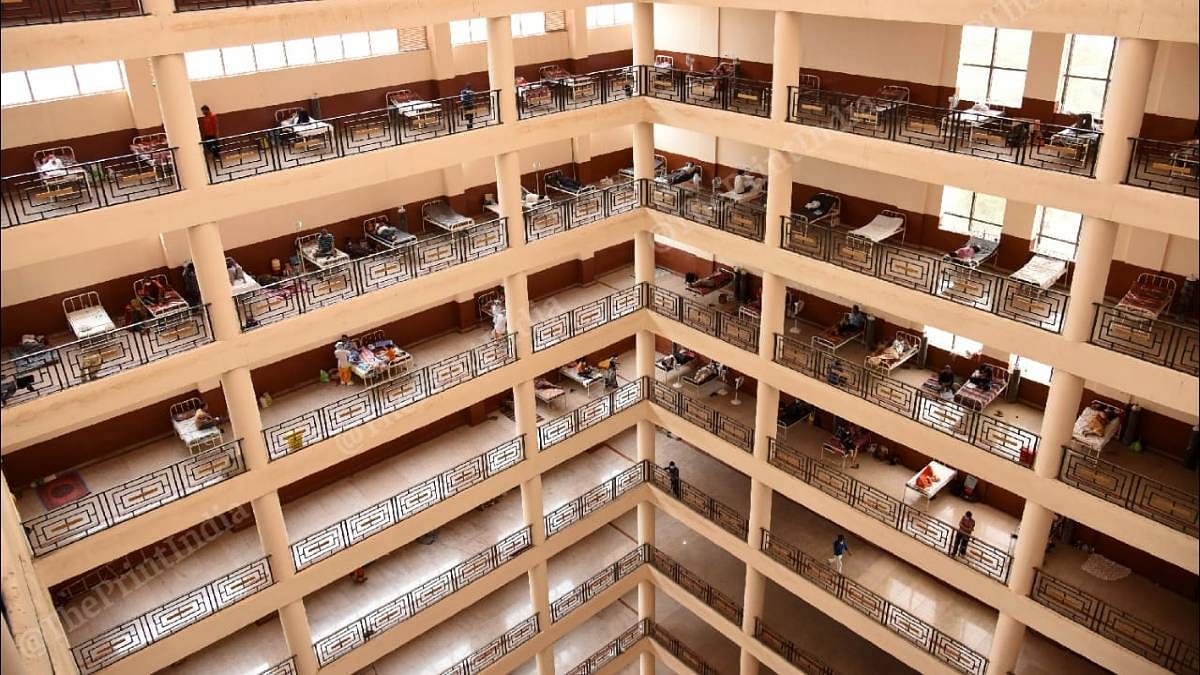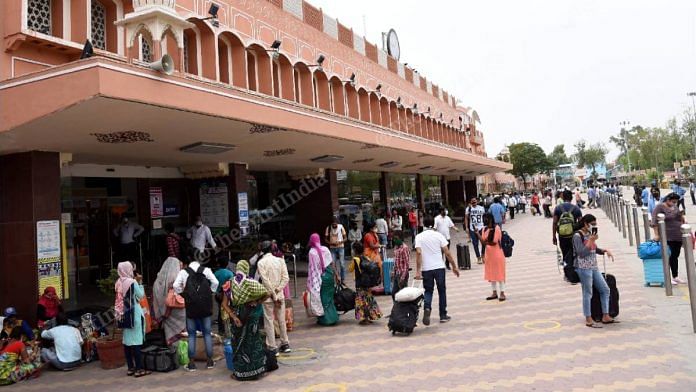Jaipur: Raj Kumar Sharma, 61, was relishing some tea and kachoris with his family, in Jaipur’s Johri Bazar, at 7am Thursday. This is a daily ritual for Sharma — offering flowers at the Tikeshwari Temple nearby and then spending some time in the neighbourhood, chatting with the priests and his neighbours.
On Thursday, however, Sharma’s presence near the temple was greeted with hushed exchanges of worry among the residents, since the family had just returned from a “Corona Hub”. On 16 April, Sharma, his wife, their two children and a driver, returned to Jaipur after a fortnight spent in travelling to and from the Kumbh Mela, neighbours told ThePrint. The mela has been tagged a Covid super spreader, but the Sharma family displays no qualms about the trip.
Talking to ThePrint, Sharma said, “This [the Kumbh Mela] is not held every year. So there is no way that we could have missed it. Yeh Corona toh weham hai sabka. (This Corona is just an apprehension).” Sharma added that he had taken a dip in the holy Ganges with a crowd that, according to his estimate, was at least seven-lakh strong.
“Hum toh shudh hokar aaye hain. Isse sab infection chala jayega, agar humare aas paas hai bhi toh (We have been purified. The dip will wash away all infections, even if there is anything of that sort near us).”
The Sharmas are not the only ones to hold this view about the Kumbh Mela.
According to the state government’s estimates, at least five to six lakh people from Rajasthan visited the Kumbh Mela in the past month. In an interaction with ThePrint, Rajasthan Health Minister Raghu Sharma said that Kumbh returnees are among the key factors behind the spread of Covid cases in the state, especially in rural areas.
From reporting daily Covid cases in three digits in February, Rajasthan is now seeing 12,000-14,000 new cases. The spike has been especially stark in rural areas and smaller districts, where the current average of a few hundred new cases daily is unprecedented, according to residents and officials.
While the Rajasthan government is in the process of putting in a more stringent mechanism to monitor and track infections among Kumbh returnees, the other reasons for the Covid spike, at least in some of the districts, could be the by-elections that were held and migrant workers from Maharashtra and Gujarat returning home, first for Holi and then since Covid lockdowns began being imposed.
Also read: British govt to Modi govt — How Kumbh Mela has been organised through epidemics
Tracking pilgrims
An analysis of Covid figures from the state reveals that the spike in cases became especially evident around the beginning of April. According to the state health bulletins, from 1,081 new cases reported on 21 March, the number went up to 1,350 on 1 April. The numbers have been on the rise since, going up to 14,468 new Covid cases on 22 April. As on 23 April, the state had 1,07,517 active cases.
The rise in the number becomes even more steep when compared with data from February — about a 100 new cases were being reported daily in the state.

Accompanying the rise in the number of cases, have been problems of shortage of medical oxygen, vaccine and remdesivir — a key drug in Covid treatment. The number of Covid-related deaths per day have also gone up.
Concerned about the spike in cases, the state government is in the process of finalising a module to trace Kumbh returnees, so as to ensure they mandatorily quarantine for 14 days. Sources in the government told ThePrint that a document has been developed, which those entering the state will have to fill out. Titled the ‘Migration Registration Service’, it will require them to mention basic personal details, along with details of whether they are displaying any Covid symptoms, their panchayat and their date of exiting and returning to the state, among other things.
Earlier in April, the Rajasthan government made a negative RT-PCR report mandatory for anyone entering the state.
But Sharma, who returned from Kumbh, told ThePrint that while his temperature was checked before entering Haridwar and after leaving the city and while entering Jaipur, he “didn’t get tested for Covid either before going [to the Kumbh Mela] or after returning”.
Another Kumbh returnee, Prem Shrawan, 35, a local priest, added, “We didn’t know a test was compulsory and anyway we are feeling fine since we have returned … no fever, nothing.”
Pushpa Agarwal, 55, who lives in Jaipur’s Johri Bazaar area, went to the Kumbh Mela on 8 April with 22 others from the neighbourhood. She got a Covid test done before leaving. “I got my report on 7 April, before leaving for the Kumbh. My driver did show my report at a check-post before we entered UP, but we weren’t asked for any details on our way back two days ago,” she said as she offered some prasad from the mela.
Last weekend, it was reported that 19 Covid positive people from Rajasthan, who had been to the Kumbh Mela, had fled from an Uttarakhand hospital. The Uttarakhand government had filed an FIR against them and alerted the Rajasthan government on 18 April.
While their fate is not known yet, Rajasthan Health Secretary Sidharth Mahajan said the state as yet did not have a total figure of the positive cases among Kumbh returnees in Rajasthan.
Also read: Modi owns India’s unfolding Covid disaster
‘Religious faith’, local polls drive spike
Meanwhile, besides the rise in the number of Covid cases in the capital city, district collectors are perturbed by the alarming increase in cases in villages.
A sub-divisional magistrate (SDM), on the condition of anonymity, said: “We are reporting 400-600 cases daily now, something that has never happened before,” and blamed the villagers’ “religious faith” for the spike.
“I personally encountered one such case wherein a patient I had met during my field visits was showing symptoms,” said the SDM, adding that when the person later tested positive for Covid, his travel history revealed that he’d returned from Kumbh.
Rural areas such as Barmer, Pali, Sikar, Sirohi, Rajsamand, Dungarpur and Tonk have been reporting a high number of cases, according to official government data. These districts recorded at least 280-300 cases each Thursday, according to the daily health bulletin released by the state.

One other reason for the rise in Covid cases in districts such as Bhilwara, Rajsamand and Sujangarh could be the by-elections that were held on 17 April. “We tried our best to control the rallies, but somethings are beyond us,” a senior member of the state Covid task force told ThePrint on the condition of anonymity. The official said that they had warned political stakeholders about the impact of these rallies and election campaigns on the Covid count in the state.
“We have also been getting a large number of patients from border districts this time,” said Dr Ajit Singh Shekhawat, superintendent of Rajasthan University of Health Sciences (RUHS), the key Covid hospital in the state. A visit to the hospital revealed that referral cases from the smaller villages have been on the rise since the beginning of April — at least 60-70 of the daily 250 new cases that come here — leading to hospital beds being queued up in corridors, from the sixth to the ninth floor, of the Covid ward buildings.
“Since the smaller district hospitals are running out of oxygen quickly, many of these cases are being referred to the bigger Covid hospitals in Jaipur,” Dr Sudhir Bhandari, member of the state advisory board of Covid-19, told ThePrint.
The other challenge facing Rajasthan is the return home of migrant workers from states like Maharashtra and Gujarat. Government officials monitoring Covid data in the state said many of the patients are those who have returned from Maharashtra after a lockdown was announced there.
“We have been in touch with station masters and bus depots to understand the movement to and from the state,” said Health Minister Sharma. Rajasthan shares its border with Madhya Pradesh and Gujarat, some of the worse-hit states in this second wave.
(Edited by Poulomi Banerjee)
Also read: After attending Kumbh Mela, Nepal’s former King Gyanendra, Queen Komal test positive for Covid




I am from Jaipur. There is no place called Chawri Bazar in Jaipur. So stop spreading narratives with fake details.